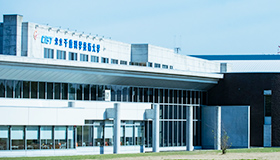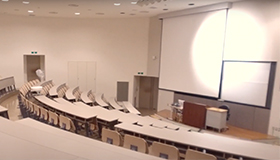Curriculum of the Department of Information Systems Engineering
Home - English - University information - Faculty of Science and Technology - Department of Information Systems Engineering - Curriculum of the Department of Information Systems Engineering
Features of the curriculum
Project-based subjects allow students to experience socially accepted teamwork and to acquire communication and presentation skills in the process of developing “thinking ability.”

The curriculum is structured so that students will acquire the necessary background knowledge and experience to be technical leaders in the global society through their own experience.
Among these, project-based subjects that can be studied in the second and third years are the main subjects of this department and directly address regional and environmental issues.
The pillar of learning is to study in a small team to reach the goal, experience the PDCA (Plan-Do-Check-Action) process, and attempt to solve problems.
While working on the themes of information, communication and ICT solution services, students experience how to consider and advance with development, and improve their basic indispensable skills as members of society.
In addition to the technical information and communication subjects, the specialized field of this department, other subjects are intended to develop students’ logical thinking ability, writing technique, positive mentality, and communication skills, thus cultivating the comprehensive inherent capabilities expected of next-generation engineers who can realize the innovations required by society.
Among these, project-based subjects that can be studied in the second and third years are the main subjects of this department and directly address regional and environmental issues.
The pillar of learning is to study in a small team to reach the goal, experience the PDCA (Plan-Do-Check-Action) process, and attempt to solve problems.
While working on the themes of information, communication and ICT solution services, students experience how to consider and advance with development, and improve their basic indispensable skills as members of society.
In addition to the technical information and communication subjects, the specialized field of this department, other subjects are intended to develop students’ logical thinking ability, writing technique, positive mentality, and communication skills, thus cultivating the comprehensive inherent capabilities expected of next-generation engineers who can realize the innovations required by society.
Outline of subjects
●Compulsory subject ★Elective compulsory subject ■Elective subject
Second year
Learning goal
To learn the basics required in each field and the ideal approach to projectsCommon subjects
●C Programming ●Fourier Basics ●Discrete Mathematics ●Information Processing System Theory ●Statistics Basics
●Java Programming ●Introduction to Information and Communication Systems ●Electronic Circuits ●Electronic Circuit Training
●Information Processing Project ●Algorithms and Programming ●Service Science
■Computer Architecture ■Computer and Language Processing ■Mobile Computing
■Information Security ■Operating System ■Writing Technique 1 ■Introduction to Algebra
■Linear Algebra I and II ■Fourier Application (can also be studied in the third year)
●Java Programming ●Introduction to Information and Communication Systems ●Electronic Circuits ●Electronic Circuit Training
●Information Processing Project ●Algorithms and Programming ●Service Science
■Computer Architecture ■Computer and Language Processing ■Mobile Computing
■Information Security ■Operating System ■Writing Technique 1 ■Introduction to Algebra
■Linear Algebra I and II ■Fourier Application (can also be studied in the third year)
Third year
Learning goal
To acquire specialized knowledge in each field, and to plan, design, develop and present increasingly advanced projectsInformation and communication application field
●Computer Network ★Hardware System Project ■Information and Communication Theory
■Information and Communication Network Engineering ■Sensor Network
■Information and Communication Network Engineering ■Sensor Network
ICT solution field
●Introduction to Software Engineering ★ICT Solution Project ■Artificial Intelligence ■Database Engineering
■Web System Programming ■Software Design ■Data Mining
■Web System Programming ■Software Design ■Data Mining
Service field
★Service Project ■Usability Engineering ■Kansei Engineering ■Education and Computer
■User Interface ■Service Engineering
■User Interface ■Service Engineering
Common subjects
●System Design Project ■Digital Signal Processing ■Statistical Analysis ■Writing Technique 2 ■Business Administration
■Corporate Literacy ■Human Communication Theory ■Internship ■Algebra I ■Introduction to Numerical Calculation
■Introduction to Geometry ■Information and Occupation ■Photonics System
■Corporate Literacy ■Human Communication Theory ■Internship ■Algebra I ■Introduction to Numerical Calculation
■Introduction to Geometry ■Information and Occupation ■Photonics System
Fourth year
Learning goal
To set a goal and apply researchCommon subjects
●Information System Seminar ●Journal Club ●Graduation Research A and B ■Complex Functions and Special Functions ■Geometry I
■Geometry I Exercise
■Geometry I Exercise
Featured subjects
Introduction to Information and Communication Systems (second year)
This subject is intended to teach basic information and communication concepts and terms.
In information theory, students learn the actual meaning of “information” by studying the history of the communication system.
At the same time, students also learn what the concept of amount in relation to information is, and how it is defined to achieve quantitative evaluation.
In information theory, students learn the actual meaning of “information” by studying the history of the communication system.
At the same time, students also learn what the concept of amount in relation to information is, and how it is defined to achieve quantitative evaluation.
Introduction to Software Engineering (third year)
Regarding management strategies involved in software design and techniques applying to design, database, networks, and data utilization as the main themes of software engineering, students acquire an overview of software engineering that incorporates all professional perspectives.
Service Engineering (third year)
In addition to existing methods such as ergonomics and psychology, students learn new methods such as the utilization of big data in the information society of recent years.
By learning to practically apply these methods, students also acquire the basic knowledge and methods for prototyping and improving services.
By learning to practically apply these methods, students also acquire the basic knowledge and methods for prototyping and improving services.



